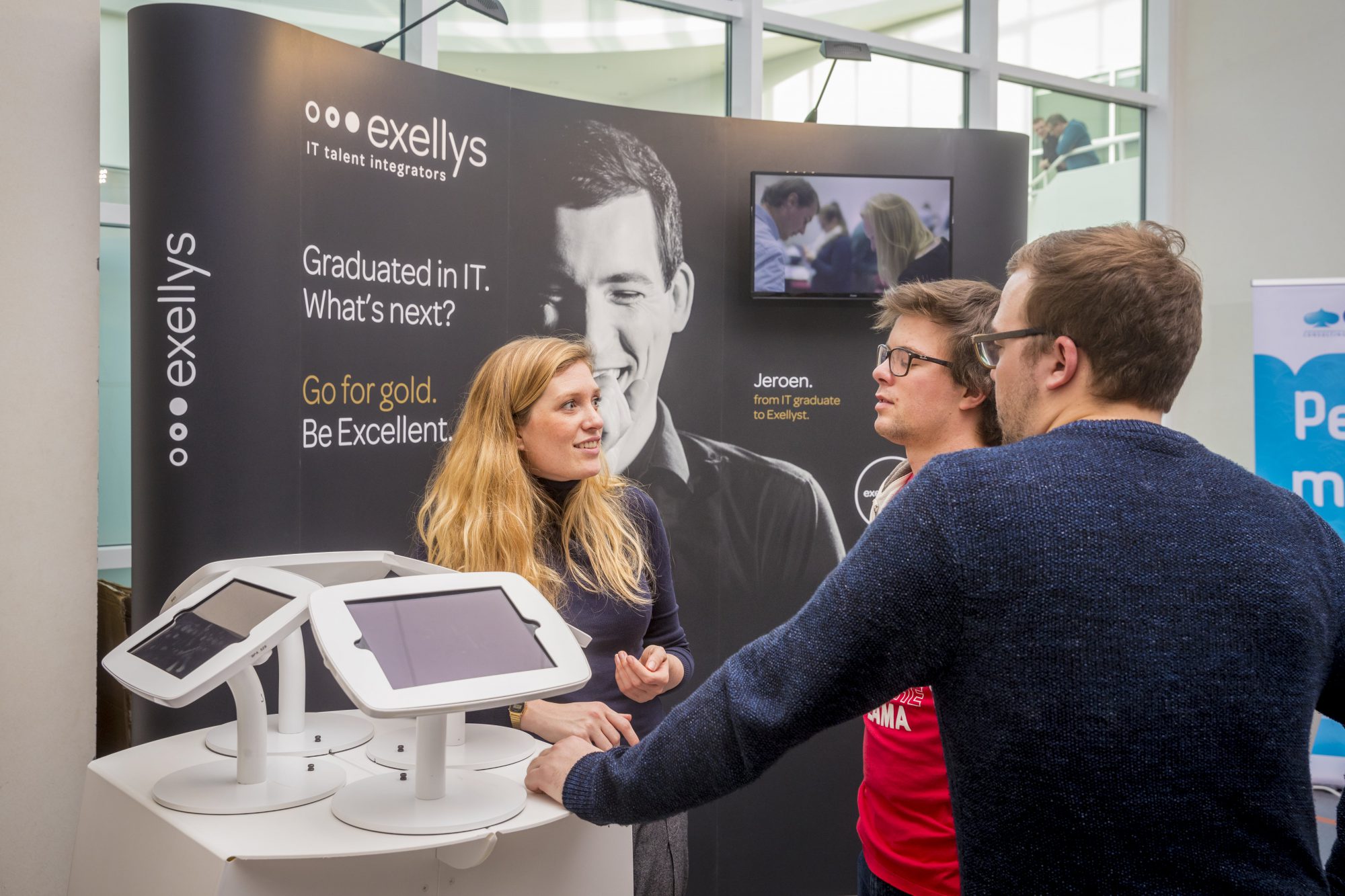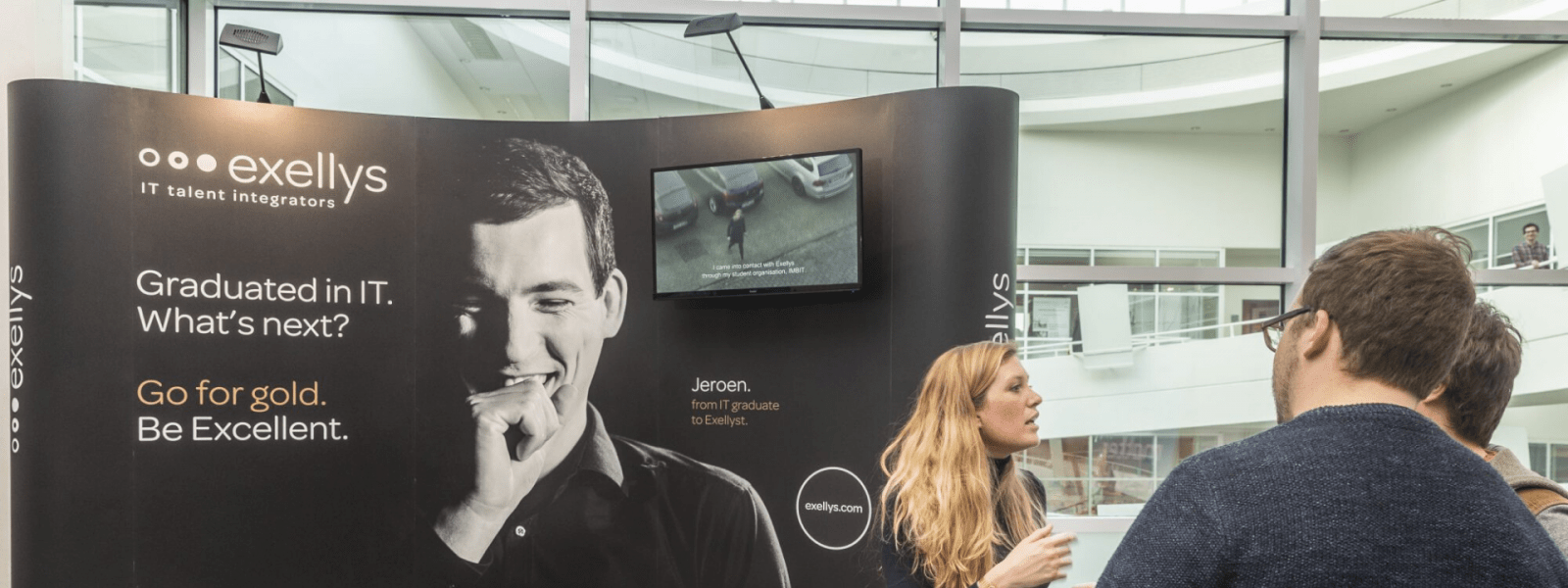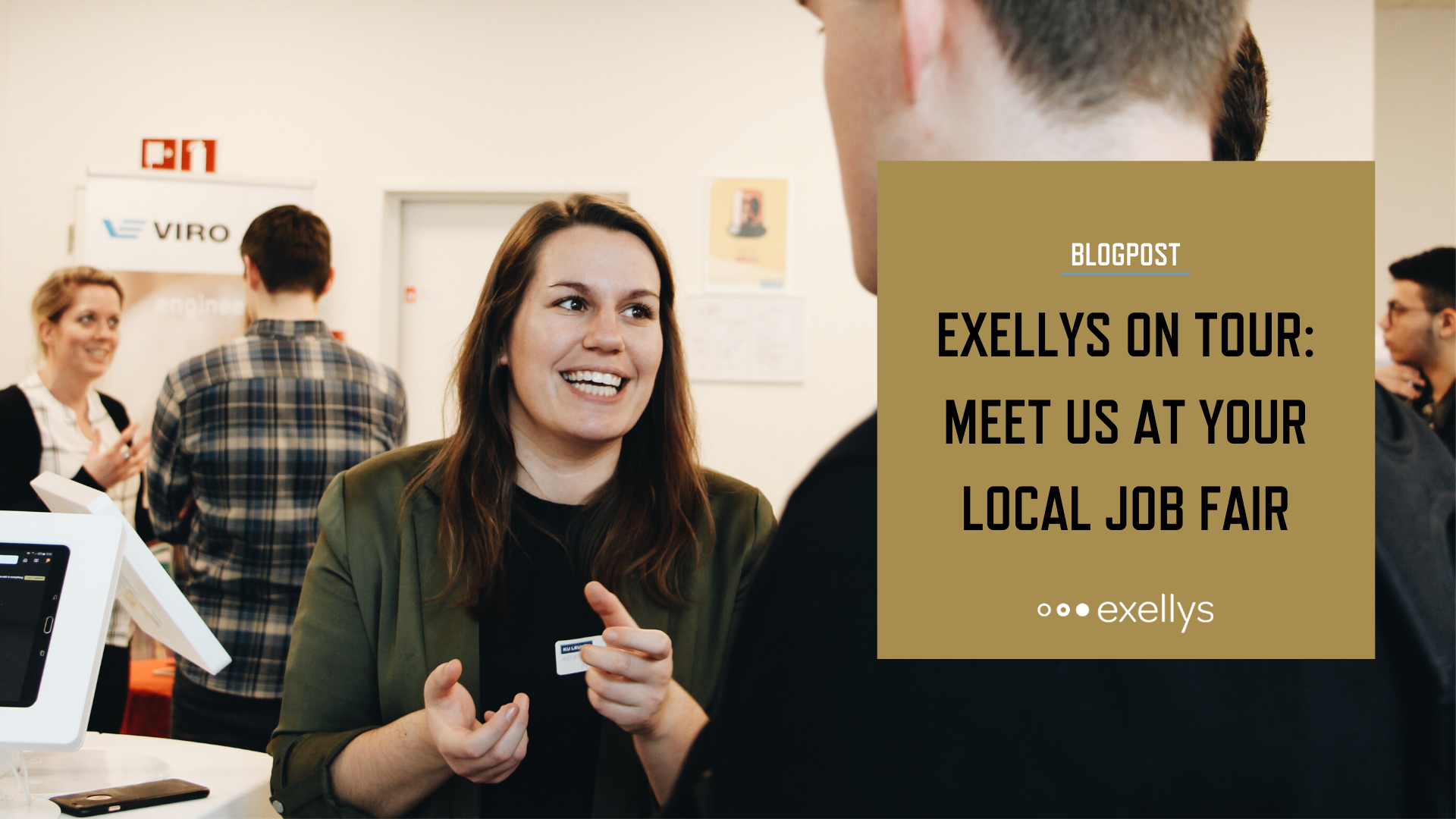The art of making a job fair worthwhile
on 18 February 2020 for GraduatesThere is a common misconception about job fairs: A lot of people seem to think that a job fair is just meant to be ‘strolled around’, to get a general idea of what companies have to offer and collect brochures and goodies. But since they are an opportunity for you to land your first dream job, taking a job fair a tiny bit more seriously is never a bad idea. For example, at Exellys we make our first assessment of candidates at fairs. If you come to our stand, you are in fact entering the first phase of your application.

How do you use a job fair to your advantage? Here are 15 important things to do before, during and after the fair.
Before the job fair
1. Select interesting exhibitors
Gather as much information as possible about the attending companies. Your time and attention will be limited, so make a smart selection beforehand.
How do you decide which companies to select? Examples of good reasons are:
- They have (or will soon have) open positions that interest you
- You have affinity with the company because of what they stand for
- You have affinity with their company culture
2. Prepare your ‘elevator pitch’
Job fairs are great opportunities to gather more information about companies, but it works the other way around as well. So prepare your ‘elevator pitch’ — a quick introduction of yourself. Include your studies, your work experience if any, your strengths and what you’re looking for.
3. Prepare interesting questions
Asking good questions not only provides you with more information, it will show that you have a genuine interest. Try to prepare 2-3 questions. Examples of good questions are:
- How do you train and guide young professionals?
- What are the long-term prospects of young professionals in your company?
- What can someone like me do for your company? (This one also shows you don’t only think about yourself.)
4. Polish your CV and print plenty
A neat, well-written CV makes you stand out, especially if you can hand it out on paper. Remember that the content is more important than the design (by the way, if you want some tips on how to construct a good CV, this blogpost will definitely interest you).
At the job fair
5. Be on time
This might seem like a no-brainer, but it’s easy to underestimate the amount of time you’ll need. Remember, it’s not a holiday, it’s a critical opportunity to find your first dream job. Make sure you have enough time to cover the entire fair and don’t miss anything important.
6. Be open to new info
It’s important to be prepared, but a job fair can also be great for inspiration. You might meet new companies that you’ve never heard of. You might learn about jobs that you had no idea existed.
7. Make a good impression
Realize that plenty of companies will keep a record of jobseekers they meet at a fair. Do your best to make it into the ‘consider hiring’ list by dressing well and demonstrating good manners — just like you would at a job interview.
8. Go easy on the goodies
There’s no fair without goodies. You’ll come across pens, chocolates, candy, bags, toys, flashlights, desk accessories, bottle openers, keychains and lots of other giveaways. It’s OK to take one, but ask politely, or kindly accept when offered. But don’t be a goodie hunter. But watching a VR movie is never a bad idea!
9. Observe
Before you approach an exhibitor, try and observe the stand. Does the exhibitor sit or stand? Do they seem interested to get to know you? Or does their face look like a Do Not Disturb sign? Use your intuition. These things can say a lot about a company.
10. Approach an exhibitor alone or in a small group
A bit nervous? You might be inclined to approach a stand with a large group. Don’t. Move alone or in groups of no more than 2-3 people, so you have a chance to have more personal conversations and ask questions. Your time is too valuable.
11. Briefly introduce yourself to exhibitor
Introduce yourself at selected booths, using the elevator pitch you prepared (not in writing, of course). It can be a good idea to practice it a few times with a friend so your introduction becomes more natural.
12. Have a meaningful conversation
Beware: some exhibitors will try and ‘sell’ themselves to you. Listen carefully to their introduction, but be critical — are they just using hollow phrases? Be sure to leave time for a few of your prepared questions. It’s probably not the best idea to ask about salary, benefits, or holidays right off the bat. These are topics that you discuss towards the end of your application procedure.
Here are 4 points exhibitors will pay attention to:
- What’s your first impression? Do you appear assertive and confident?
- Do your questions show motivation and interest?
- Are you knowledgeable and passionate about your line of studies?
- Are you a good listener?
13. End in style
Everyone has lots of people to talk to, so keep it short — aim for no more than 5 minutes in total. Thank the exhibitor for the info and their time. If you are seriously interested in working at a certain company, ask them for a business card. You’ll want to proactively get in touch a few weeks after the job fair.
By the way, if you’d like to meet Exellys soon, check out this list of job fairs we’re visiting in 2020.
After the job fair
14. Follow-up after a few weeks
Are you interested in a particular company but they haven’t gotten in touch after 1-2 weeks? Then it’s a good idea to take some initiative. This is where those business cards come in handy. Call the person you talked to at the fair and ask for more information or the possibility of a job interview.
15. Be quick
If you want to work at a company, move quickly. It doesn’t matter that you haven’t graduated yet — if you wait until June, the coolest jobs might have already been taken.
In conclusion
With the points above, you now have a guide to making the most of a job fair. That means a significant advantage for you, plus it might make a big difference to the start of your career. Good luck, and may your next job fair be a fruitful one.
Tags: career , job hunt , talent attraction , video





